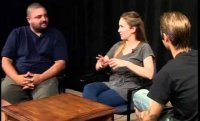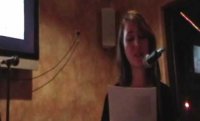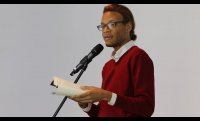Jynne Dilling Martin’s poetry has appeared in Granta, the New York Review of Books, the Believer, Slate, Ploughshares, the Boston Review, and on the PBS NewsHour with Jim Lehrer, among other places. Her nonfiction has appeared in Glamour, Food & Wine, and the Antarctic Sun. She was a Yaddo fellow and the National Science Foundation’s 2013 Antarctica Writer in Residence. Martin lives in New York City and is the associate publisher of Riverhead Books, an imprint of Penguin Random House. She is the author of the poetry collection, We Mammals in Hospitable Times, published by Carnegie Mellon University Press in February 2015.
 What do you do to get inspired? I read peculiar ephemera, old journals, and catalogues. The series on deaths in U.S. national parks is up next on my list!
What do you do to get inspired? I read peculiar ephemera, old journals, and catalogues. The series on deaths in U.S. national parks is up next on my list!
What are your reading dos? I’m a big fan of readings that are short on reading and long on conversation. Anyone who has attended a David Mitchell reading knows already that the most delightful parts are the very long digressions, jokes, and personal revelations that he inserts at random while reading to you. It feels like you’re having a slumber party with a very dear friend. I aspire to that level of connection, surprise, and warmth.
…and your reading don’ts? Don’t arrive drunk. Don’t arrive sober either. Don’t forget to bring your book, it’s not fun watching people awkwardly read off of their phone, and seems to happen more and more often. Don’t apologize. Don’t turn as bright red as I do. And don’t forget to thank everyone, like the Roerich Museum and Poets & Writers and your introducer by name, who offered this lovely opportunity.
What’s the most memorable thing that’s happened at an event you’ve been part of? I’m honored to have read jointly with Phil Klay at one of the first readings he ever gave, when his story “Redeployment” was in a 2011 issue of Granta, alongside one of my poems. He blew me, and all of BookCourt, out of the water. I feel lucky that I got to know his work so early, and it’s been a joy to watch him find such an enormous readership in the years since.
How does giving a reading inform your writing and vice versa? Writing is such a solitary act, so the few readings I do each year constitute the rare times I am forced out of my shell and into direct engagement with readers about my poems. It’s so meaningful to find that there is a thoughtful, receptive, interested readership for poetry out there.
What do you consider to be the value of literary programs for your community? To engage with literature is an enormously empathic act, the act of inhabiting the emotional landscape and values of another; and right now, it feels more urgent than ever to have our horizons broadened, and to better understand each other on this planet. I am so grateful for institutions like Poets & Writers that nurture and sustain a community of expression, connection, and literary community.
What you probably spent your R/W grant check on: A month of lattes from Hungry Ghost.
Photo: Jynne Dilling Martin. Photo Credit: Adrian Kinloch. Support for Readings & Workshops in New York City is provided, in part, by public funds from the New York State Council on the Arts, and the New York City Department of Cultural Affairs, with additional support from the Louis & Anne Abrons Foundation, the Axe-Houghton Foundation, the A.K. Starr Charitable Trust, and the Friends of Poets & Writers.












 What do you do to get inspired?
What do you do to get inspired?